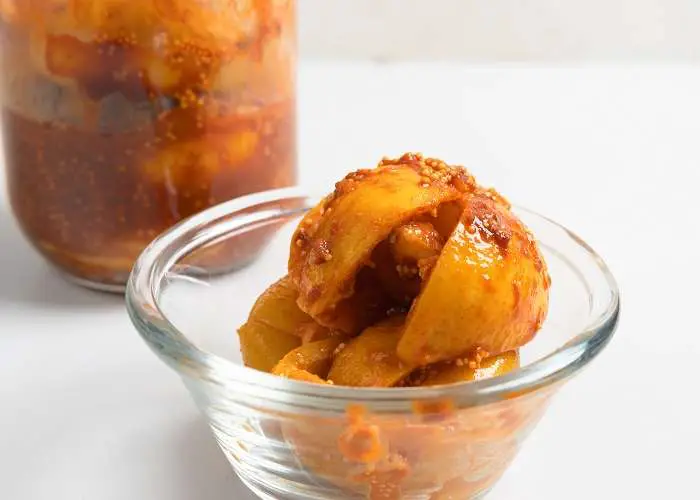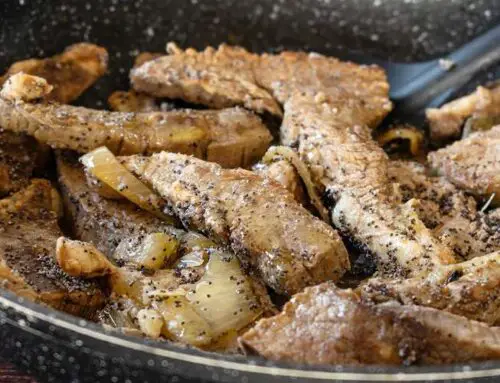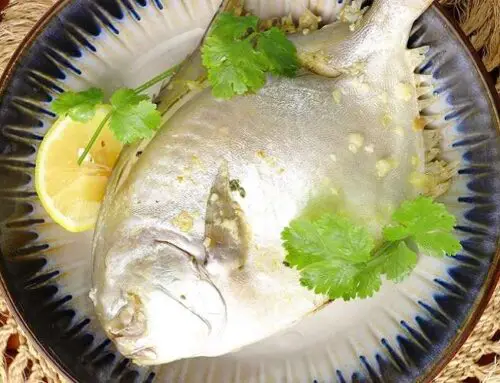Lebur Achar Recipe
Achar or pickle is a significant part of Bangla cuisine. Achar or, South Asian Pickle to be more specific, have been a part of our cuisine for at least a thousand years.
The earliest known record of achar or pickle is of mangoes. But Ayurvedic and Sangam period texts refer to other varieties of pickles as well. Stone apple (beal), lime, raw cardamom, long pepper, and so many other pickle recipes can be found in ancient and medieval texts.
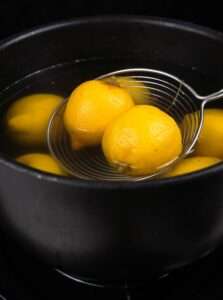
But these achar recipes evolved over time. The influence of concurrent rulers, and their trade policies played a huge part in this. Like the Portuguese first brought chilli peppers in this subcontinent during the Mughal Rule. And now chillies are a very popular ingredient for pickle recipes.
Now pickle or achar both refer to fermented, preserved condiments. Leaving the definition of achar there would be a big injustice. I have never had western pickle, but I am sure it does pack the flavor and kick of achar. (Just pickle Rick is an exception.)
Western pickles, be it homemade pickle or factory made, typically use vinegar or brine for preservation. And the flavors are sour, salty, and sometimes sweet.
South Asian pickle or achar is preserved in oil, typically mustard or sesame. But we all know mustard oil is where the real magic is, as evident in this lemon pickle by grandma.
The flavor profiles of homemade achar are also mainly sweet, sour, or salty. But the flavors have a very strong punch as you would expect from a Bengali dish. And be sure that the same is true for this Lebur Achar Recipe.
As I mentioned. Achar recipes date back to thousands of years. Back then the focus was possibly on finding ways of preserving the food items. But this practice has stayed true to this day.
Almost every Bangladeshi can relate to their mother’s preparing a variety of homemade pickle or achar. Summer is the season of fruits, so there are plenty of ingredients to go around. So any achar has a special special in Bengali’s hearts.
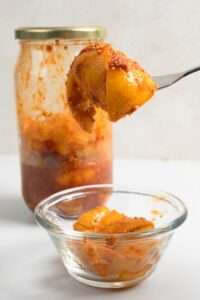
All of you living abroad do not have access to the Bangla fruits. But you can get your hands on lemons. Maybe Moni Dadi knew that someday her grandchildren will be living abroad and missing homemade pickles. So she noted down this Lebur Achar or Lemon Pickle Recipe.
And trust me, it is as delectable as it looks in the Lebur Achar Video. The cooking process is also fairly simple, but you will need to let the lemons marinate for a few days. But no need to sun dry the lemons like mother or grandmother did. So you can make the recipe whichever season you want. .
You can adjust the ingredients to make it sweet lemon pickle, or to crank up the spiciness according to your taste. Or just follow the Lemon Pickle Recipe instructions to the dot and you will surely be delighted.
Ingredients
- 6-8 whole lemons
- 3-4 tbsp salt to taste
- 2-3 tbsp sugar optional
- 2-3 tbsp red chili powder
- 1 tbsp garlic paste
- 2 tbsp mustard seeds
- 2-3 tbsp mustard oil
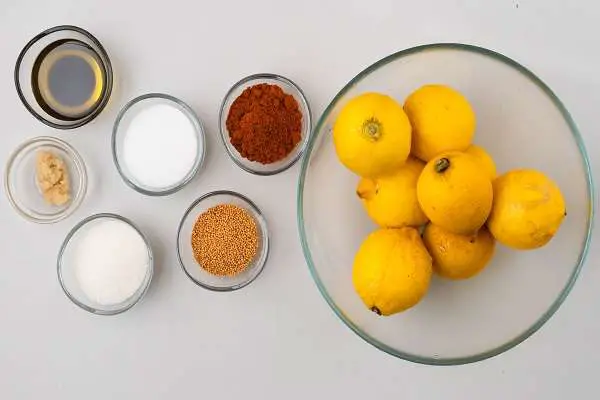
Instructions
- Boiling the lemons: Bring water to a boil in a pot and add the whole lemons. Boil them over medium heat for 5-7 minutes until the peel becomes soft.
- Preparing the lemons: Remove the lemons from the water and let them cool completely. Then, cut each lemon into four parts without slicing all the way through, so the segments remain attached.
- Adding salt: Make small deep cuts in each lemon segment. For large lemons, add ½ teaspoon of salt into each cut; for smaller lemons, use ¼ teaspoon. Place the lemons in a glass jar and let them sit for 2-3 days to release their juices.
- Adding sugar and sun-drying: After 2-3 days, add a little sugar inside each lemon (if desired). Place the lemons under the sun for about 2 hours daily for 3-4 days until the juice thickens and absorbs.
- Adding spices: Once the lemons are slightly dried, coat them with red chili powder and garlic paste. Leave them in the sun for a short time (about an hour).
- Final step: Mix in mustard oil and whole mustard seeds. Stir well, transfer the lemons into sterilized glass jars, and let them marinate at room temperature for at least one week before consuming.
Notes

